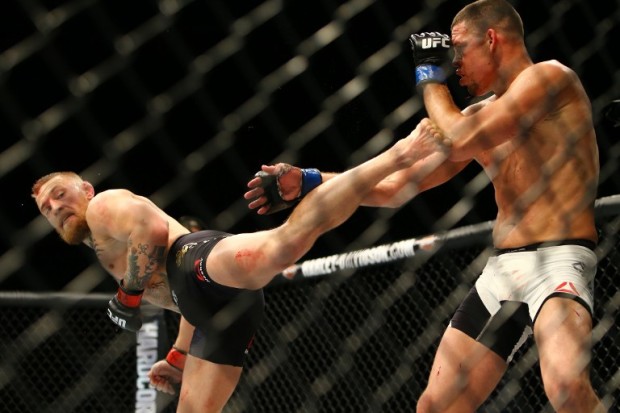New York clears way, lifts ban on professional mixed martial arts

LAS VEGAS, NV – MARCH 5: Conor McGregor (L) kicks Nate Diaz during UFC 196 at the MGM Grand Garden Arena on March 5, 2016 in Las Vegas, Nevada. Rey Del Rio/Getty Images/AFP
ALBANY, New York — New York’s Assembly voted 113-25 Tuesday to legalize mixed martial arts, clearing the way for fights late this year and expanding the combat sport into the last state to still prohibit it.
Gov. Andrew Cuomo supports legalizing the combination of wrestling, kickboxing and judo. The state Senate has already passed the identical measure.
Critics call MMA too violent and like football and boxing prone to causing concussions and head injuries. Some said it inspires domestic violence and invites children to imitate it.
“This is barbaric and it should be banned,” said Assemblyman Charles Barron, a Brooklyn Democrat. “It goes too far for your entertainment.”
Provisions were added to reduce opposition, including raising the insurance required for fighter injuries to $50,000 and to $1 million for life-threatening brain injuries. It requires insurance of $50,000 for the estate of an athlete fatally injured.
Advocates say it has evolved from rougher early days with more rules to protect fighters, who are trained professionals. Meanwhile, it’s on television, and fighters train and amateurs already compete in New York in unregulated bouts.
Assemblyman Joseph Morelle, the lead sponsor, said the law will authorize the state to oversee the amateur bouts as well. “What we seek to do is essentially take the sport out of the shadows in New York,” he said.
Conducted inside a cage or other enclosure with a referee present, MMA fights end when one fighter quits or gets knocked out or when judges decide after 15 or 25 minutes of fighting who the winner is.
The Assembly left the ban intact for years over fears that the sport was too violent. A Democrat-controlled chamber approved MMA in 2007, then subsequently balked. The Republican-controlled Senate, initially reluctant, has voted to legalize it for seven straight years.
Assemblywoman Margaret Markey, a Queens Democrat who chairs the tourism committee, said she initially opposed MMA after running into a group of destitute ex-boxers. Added protections for fighters have made it “palatable, at least to me at this point in time,” she said, though said later she still has reservations.
The committee voted 15-5 for it.
Assemblywoman Pat Fahy, an Albany Democrat, noted those changes but voted against it, citing its violence and growing evidence of serious brain injuries and concussions in football and boxing.
“In football, concussions can be incidental to the game. Here, it is more part of the sport,” she said.
One early opponent was UNITE HERE, the hotel and restaurant workers’ union, publicly citing American Medical Association opposition and the potential social costs of teens imitating fighters. One consistent advocate is Ultimate Fighting Championship, the sport’s largest U.S. promoter, whose backers are major owners of nonunion Station Casinos in Las Vegas.
UFC has its eyes on hosting a major fight card late this year at Madison Square Garden and predicts there will be other professional shows next year in Brooklyn, Buffalo and smaller cities.
“I do support mixed martial arts because it’s also an economic generator,” Gov. Andrew Cuomo told reporters Tuesday in Niagara Falls. The state would collect 3 percent of gross receipts broadcast rights, not to exceed $50,000, and 8.5 percent from gross ticket receipts, as well as licensing fees.
Fighters wear small, fingerless gloves and little else. They punch, kick, elbow, grapple, knee, trip, tackle, slam and choke each other inside a cage.
The legislation puts MMA under the control of the State Athletic Commission, which regulates professional boxing with drug testing, officials and ringside doctors. It would have to prepare to do the same for MMA. The legislation, once signed by Cuomo, would take effect in 120 days, giving the commission time to issue rules and set up staffing.
The measure authorizes the state to study potential funding mechanisms for long-term care of fighters who develop degenerative brain conditions.
New York’s longstanding insurance minimums have been $7,500 for pro boxer and wrestler injuries and $100,000 for an athlete killed.